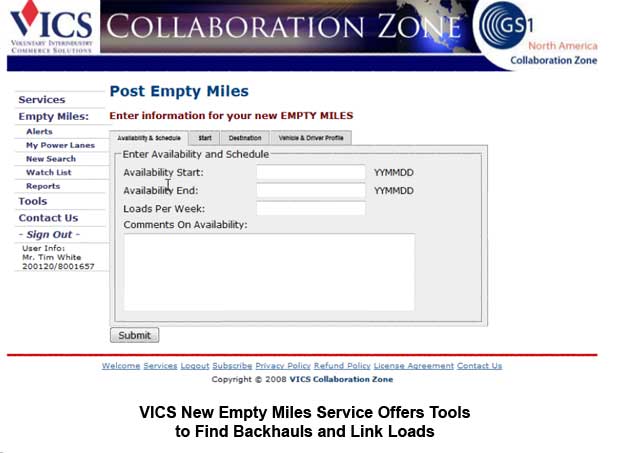For example, in the portal, users can post “Power Lanes” – lanes where they are currently running “empty miles,” which then become searchable by other shippers. (See graphic below).

Andraski also says that the portal is not meant to be the place where participants arbitrate how freight costs will be shared, handle insurance, and other specifics of their arrangement.
“Once two shippers see they may have complementary freight, it’s up to them to work out those details between themselves,” Andraski said.
Cost shouldn’t be a barrier. The service costs just $1600 per year for companies that are already VICS members, and $1850 annually for non-VICS members. Andraski said that he believes in some cases a retailer may encourage, for example, one of its suppliers that is not a VICS member to join so that they can look together for backhaul opportunities more easily.
Andraski says so far the service has 10 subscribers, most of which are retailers. He emphasizes that the service is not just for retailers with private fleets, but also those that use dedicated and contract carriage, and even the carriers themselves, who may find opportunities to return or reposition assets more effectively.
Another Attempt to Get Collaboration to Work
The VICS service is another in a number of attempts, many by commercial software providers, to make a success of logistics collaboration. Despite what continues to be strong interest from many shippers in the concept, in practice, collaboration portals have not gained substantial adoption.
Andraski says the low cost of the VICS service may be one difference.
“You may be able to save the cost of the subscription in just a few moves,” he said.
He also noted that now, in addition to the potential to reduce transportation costs, the Green impact of collaboration may encourage more companies to make a stronger effort to get the concept to work.
“When you collaborate, you not only can reduce freight costs but also carbon emissions, fuel consumption, and miles driven,” Andraski notes. “Almost any major company and many smaller ones are looking for ways to improve Sustainability, and here is an excellent opportunity.”
What is your view of the VICS Empty Miles service? What is needed to make this type of collaboration a success? Let us know your thoughts at the Feedback button below.